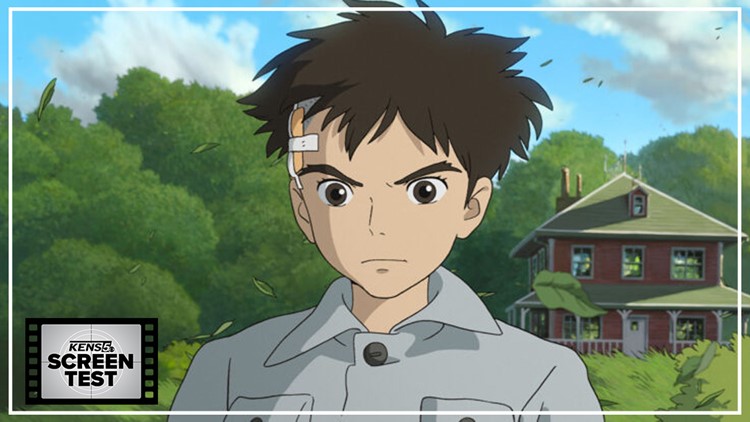TEXAS, USA — An ostensibly abandoned tower hiding grand designs… a faction of humanoid parakeets marching in unison… white sprites floating to the sky, preparing to be born… a grumpy oaf who literally swallows himself up into his heron disguise…
Those are just some of the things you’ll see in Hayao Miyazaki’s “The Boy and the Heron,” the legendary Japanese director’s first feature in a decade. The sights are as beautiful as how inexplicable they appear at first blush. Maybe it’s because American animation has become so concerned with conceptual structure (a few multiversal and stop-motion exceptions notwithstanding) that it’s startling the first time we realize not everything in “The Boy and the Heron” will be explained, that not every beautiful flourish is a cue for rules to override the emotional textures Miyazaki refines as well as just about any filmmaker. Startling… then entirely liberating the further you allow yourself to sink back into the wisdom and whimsy of a mind who for decades has set himself apart by embracing the fact that his worlds are so much bigger than any of his movies can possibly do to contain them. Eventually – magically – it starts to make sense that so little in “The Boy and the Heron” does.
The chief spark behind this shift in our understanding is that for young Mahito (voiced by Soma Santoki), absence of logic doesn’t seem to matter very much anyway. After all, the boy is in a strange new world of his own. Mahito has lost his mother in an apocalyptic World War II air raid and moved with his father to a place where familiar urban bustle has been replaced by the serenity of nature—a bountiful quiet inviting the kind of reflection Mahito might not be ready for, even as a new stepmother prods him along by having him feel her pregnant belly. Curiosity is a consistent player in Miyazaki’s films. But the first indication of the maturity simmering under “Boy and the Heron’s” gossamer palette is Mahito’s initial reluctance to give in to the bursts of wonder flying at him – quite literally, in the form of a pesky gray heron – for fear that his memories might not be able to keep up when he surrenders to whatever fantasy awaits.
Miyazaki has long practiced wondrously patient storytelling, the kind of uncanny dreamy mode that allows his driving themes – childhood, agency, corruption, friendship, all of which are present here in some way – to come forth organically, as if he were less a visionary than an anthropologist of the human spirit. He presents stupefying images splendidly, turning them into an invitation to learn more about the worlds he’s created, whether they reside in the sky, in hulking Earthbound towers or in a city being serviced by a kind young witch zipping around on a broomstick.
In “The Boy and the Heron,” the natural world is a bit mysterious, a little frightening and entirely intriguing; take the heron itself (voiced by Masaki Suda), who takes on increasingly human qualities until he presents Mahito with a proposition he can’t ignore: Come along, and find out your mother is still alive.
The heron’s proclamation isn’t quite that straightforward, but it isn’t an outright lie either. Welcome to one of this wondrous film’s motivating dynamics: The alchemy of truth and lies that characters create to justify their decisions. In a disturbing early scene, Mahito is roughed up by bullies on the way home from school, but later proceeds to bash himself in the side of the head when he’s out of harm’s way. He stays home from school, bandaged and scarred and recovering, having… what? Lied about how bad the attack was? Leaned into the truth of his feelings? For an act that seemed to instinctual, the motivation may not be so simple. Regardless, reality has been crinkled after his confrontation. The movie will go on to crinkle it dozens, hundreds more times, twisting the familiar in and out and in and out until it’s an origami structure of itself—”The Boy and the Heron” goes to places we would’ve once described as unrecognizable, yet over the course of two hours feels part and surreal parcel with Mahito’s journey of indifference and eventual recognition.
Don’t be surprised if you feel it more than you understand it, particularly as “Boy and the Heron” takes on an episodic quality mirroring past Miyazaki works like “Spirited Away” or “My Neighbor Totoro.” If the film ever feels like it lacks in urgency, it may be because Mahito himself hasn’t quite figured out what he wants or needs at this point in life, when loss continues to haunt him. Miyazaki nonetheless makes the contradiction work, in no small part because the beauty of “The Boy and the Heron” is spiked with moments of horror, the silliness girded with something vaguely threatening until it presents itself with shattering, uncompromising force. “Forgetting is normal,” a character says at one point. Only Miyazaki can make a kaleidoscope of meaning out of such a simple statement.
"The Boy and the Heron" is rated PG-13 for some violent content/bloody images and smoking. It's now in San Antonio theaters. Runtime: 2 hours, 4 minutes.
Starring: Soma Santoki, Masaki Suda, Takuya Kimura, Aimyon. (The dubbed, English-language version boasts an impressive cast, including Christian Bale, Dave Bautista, Willem Dafoe and Robert Pattison.)
Written and directed by Hayao Miyazaki
2023
>MORE REVIEWS:



